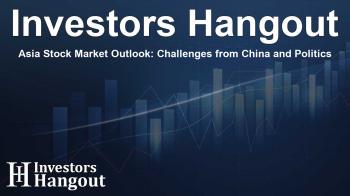Asia Stock Market Outlook: Challenges from China and Politics

Asia's Stock Market Sentiment Declines
Recently, Asian stock markets have faced a subdued atmosphere, largely influenced by a mix of global events and economic data. While trading volumes dipped ahead of the year's end, investors turned their attention to updates regarding Chinese manufacturing activity, which has significant ramifications for the broader region.
With many major stock indexes closed for holiday festivities, the lack of trading volumes further compounded the dynamics. Markets across Japan, South Korea, and Thailand remained inactive on what marked the last trading day of the year, while traders in Hong Kong, Australia, the Philippines, and New Zealand dealt with shortened trading sessions.
The Impact of China's Manufacturing Activity
On a notable note, Chinese stocks experienced a drop as crucial manufacturing activity showed signs of moderation. The Shanghai Shenzhen CSI 300 and the Shanghai Composite indexes both reported a decline of 0.4%. Meanwhile, the Hang Seng index in Hong Kong managed to rise by 0.7%, reflecting some regional divergence.
The latest purchasing managers' index data revealed that China's manufacturing sector experienced growth for the third consecutive month. This expansion was primarily fueled by new stimulus measures aimed at bolstering the economy. However, the results were somewhat disappointing, coming in lower than analysts had anticipated and trailing behind prior month figures.
This decline has raised concerns regarding the sustainability of growth for China, the world’s second-largest economy. Investors are particularly attentive to the ongoing economic slowdown and the ongoing struggles within the property sector.
Market participants are eagerly awaiting clarity from Beijing on its future stimulus strategies. Recent indications suggest that the government plans to enhance fiscal expenditure to underpin economic growth in the upcoming year, which could prompt market adjustments.
In the context of trading activity in Australia, which heavily relies on its relationship with China, the S&P/ASX 200 index also saw a markdown of 0.9%. Furthermore, Indian markets reflected similar caution, as the Nifty 50 Futures slipped by 0.2%. Meanwhile, the Straits Times Index in Singapore maintained stability.
In Malaysia, the FTSE KLCI index experienced a slight dip of 0.1%. These movements underscore a generalized caution among investors across the continent as they navigate a complex economic landscape.
The Political Climate in South Korea
Amidst these economic concerns, South Korea is facing deepening political uncertainties. The KOSPI index was closed as the nation grapples with significant political turmoil, including the legal troubles of President Yoon Suk Yeol, who has recently faced an impeachment vote. Remarkably, a South Korean court has approved an arrest warrant for him over allegations of martial law imposition, which further complicates the political climate.
Investors are concerned about how these political developments could affect economic policies moving forward and may lead to fluctuations in market confidence in South Korea. With a series of declines observed in KOSPI, or four straight days of loss, the market sentiment appears to reflect trepidation regarding stability.
The combination of external economic pressures and internal political challenges presents a unique set of hurdles for the Asian markets as we head into the new year.
Looking Ahead: Market Sentiment and Outlook
As we close out the year, the outlook for Asian markets remains clouded by these prevailing concerns. Traders and analysts will continue to monitor developments in both China and South Korea during the early weeks of the new year. The hope for recovery hinges on effective policy implementations and successful initiatives aimed at bolstering both economic and political stability.
With the potential for renewed stimulus measures from Chinese authorities and a resolution to South Korea’s political predicament, there may yet be opportunities for positive market movements. As always, an observant eye on global economic trends will be vital for investors navigating this landscape.
Frequently Asked Questions
What factors are influencing Asian stock markets currently?
Asian stock markets are currently influenced by thin trading volumes, Chinese manufacturing data, and political instability in South Korea.
How has China's manufacturing sector been performing?
China's manufacturing sector has expanded for three consecutive months but recently saw slower growth than expected, raising economic concerns.
What are the implications of the South Korean political crisis?
The South Korean political crisis, particularly surrounding President Yoon Suk Yeol, may affect economic policy and investor confidence in the region.
What strategies might the Chinese government implement to support the economy?
There are indications that the Chinese government may enhance fiscal spending to support economic growth amidst current slowdowns.
How should investors approach the Asian markets amid these challenges?
Investors should stay informed about economic and political developments in Asia and adjust their strategies accordingly to mitigate risks.
About Investors Hangout
Investors Hangout is a leading online stock forum for financial discussion and learning, offering a wide range of free tools and resources. It draws in traders of all levels, who exchange market knowledge, investigate trading tactics, and keep an eye on industry developments in real time. Featuring financial articles, stock message boards, quotes, charts, company profiles, and live news updates. Through cooperative learning and a wealth of informational resources, it helps users from novices creating their first portfolios to experts honing their techniques. Join Investors Hangout today: https://investorshangout.com/
Disclaimer: The content of this article is solely for general informational purposes only; it does not represent legal, financial, or investment advice. Investors Hangout does not offer financial advice; the author is not a licensed financial advisor. Consult a qualified advisor before making any financial or investment decisions based on this article. The author's interpretation of publicly available data shapes the opinions presented here; as a result, they should not be taken as advice to purchase, sell, or hold any securities mentioned or any other investments. The author does not guarantee the accuracy, completeness, or timeliness of any material, providing it "as is." Information and market conditions may change; past performance is not indicative of future outcomes. If any of the material offered here is inaccurate, please contact us for corrections.
